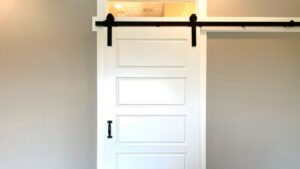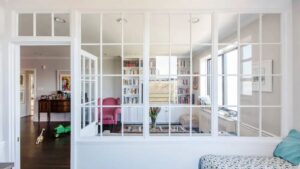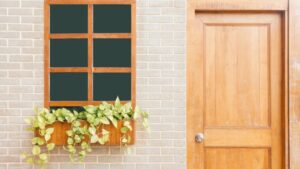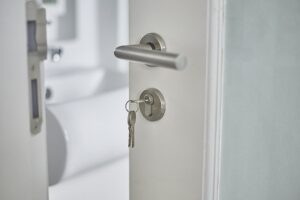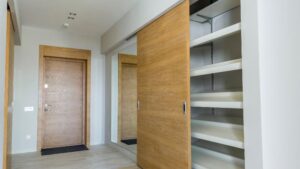Sliding glass doors have become a staple in modern homes. They offer beautiful views and seamless indoor-outdoor transitions. From traditional to contemporary designs, sliding glass door types range from classic aluminum frames to energy-efficient vinyl systems, each offering unique benefits in terms of insulation, security, and aesthetic appeal.
In this post, we’ll explore different types of sliding glass doors to help you make an informed purchase decision.
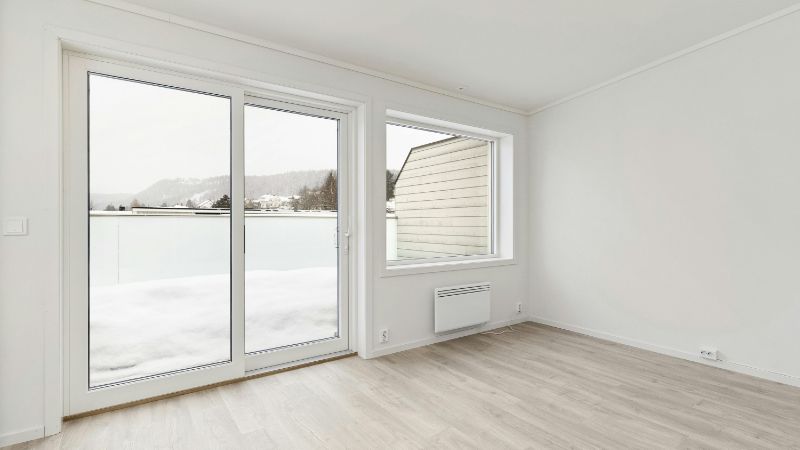
Understanding Sliding Glass Doors
Sliding glass doors have revolutionized how we connect indoor and outdoor spaces, offering both functionality and aesthetic appeal. These versatile doors operate on tracks that allow panels to glide horizontally with minimal effort.
Basics of Sliding Glass Doors
Sliding glass doors consist of at least two panels, with one fixed and one mobile panel that slides along tracks. The tracks are typically made of aluminum or stainless steel for durability and smooth operation. Most modern sliding doors feature tempered or laminated glass for safety and enhanced energy efficiency.
Standard sizes range from 5 to 12 feet in width, with 6’8″ and 8′ being common height options. The frame materials vary widely, including:
- Aluminum: Lightweight and low-maintenance
- Vinyl: Excellent insulation and affordability
- Wood: Classic appearance with natural insulation
- Fiberglass: Durability in extreme weather conditions
Installation typically requires professional help to ensure proper alignment. Many newer models feature multi-point locking systems and reinforced frames for improved security.
4 Types of Sliding Glass Doors
Sliding glass doors come in several designs to suit different architectural styles, space constraints, and functional needs. Each type offers unique benefits, from space-saving solutions to enhanced aesthetic appeal.
Pocket Sliding Doors
Pocket sliding doors disappear completely into the wall when opened, creating an unobstructed opening between rooms or to the outdoors. These doors slide into a hollow cavity built into the adjacent wall.
They’re perfect for small spaces where swing doors would take up too much room. When planning for pocket doors, the wall cavity must be twice the width of the door panel.
Installation requires specific framing during construction or renovation, making them slightly more complex to retrofit in existing homes. The tracks need regular cleaning to ensure smooth operation.
Benefits include:
- Maximum space efficiency
- Clean, minimalist appearance when open
- No door swing to accommodate in furniture placement
Modern pocket door systems feature soft-close mechanisms and improved rollers for quieter operation and easier use.
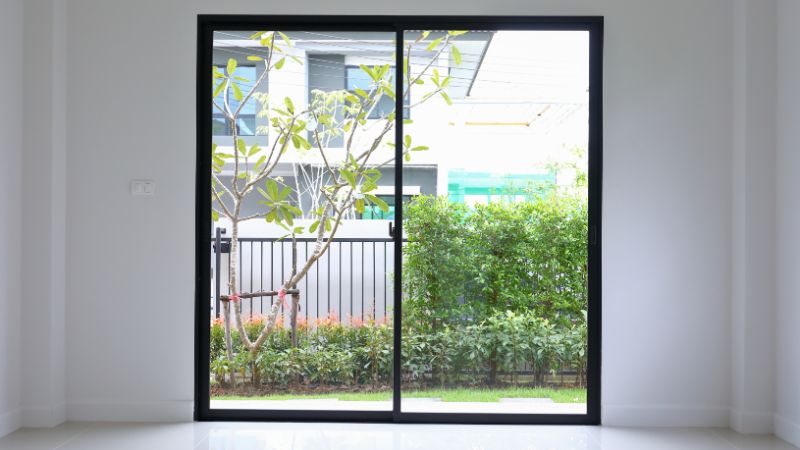
Bypass Sliding Doors
Bypass sliding doors feature two or more panels that slide horizontally past one another on parallel tracks. These doors are commonly used for closets, wardrobes, and as room dividers in smaller spaces.
The overlapping design makes them ideal when there isn’t enough room for folding or swing doors. Installation is relatively straightforward and doesn’t require special wall construction.
Bypass doors typically hang from an overhead track with guides at the bottom to prevent swinging. This design allows partial access to the opening at any time.
Popular materials include:
- Glass panels for a contemporary look
- Mirrored surfaces for closets
- Wood or composite for warmth and privacy
These doors work well in modern and traditional homes alike. Hardware options range from basic to premium with soft-close features and decorative handles.
Bi-Fold Sliding Doors
Bi-fold sliding doors consist of panels hinged together that fold back accordion-style when opened. They combine sliding motion with folding action to create wide openings while taking up minimal space.
These doors work particularly well for connecting indoor and outdoor living spaces. When fully opened, they create a nearly seamless transition between areas.
Bi-folds typically run along top-mounted tracks with floor guides to ensure stable operation. The panels stack neatly to one or both sides when opened.
Key features:
- Available in configurations from 2 to 8 panels
- Can span openings up to 24 feet wide
- Typically feature more glass and less frame than traditional doors
Modern bi-fold systems offer enhanced security with multi-point locking systems and toughened safety glass. They’re available in aluminum, wood, and vinyl frames to match any home style.
French Sliding Doors
French sliding doors combine the elegant look of traditional French doors with space-saving sliding functionality. They feature wide stiles and rails that frame glass panels, creating a classic aesthetic.
Unlike swinging French doors, these slide along tracks to open and close. This design preserves the traditional look while saving space and providing better security against wind.
The frames typically contain more wood or metal than standard sliding doors, giving them a more substantial appearance. They’re available in various configurations with single or multiple sliding panels.
Design elements include:
- Wide stiles and rails
- Multiple glass panes or grids
- Decorative hardware options
French sliding doors offer excellent insulation properties and can incorporate energy-efficient features like low-E glass and weatherstripping. They work beautifully in transitional homes that blend traditional and contemporary styles.
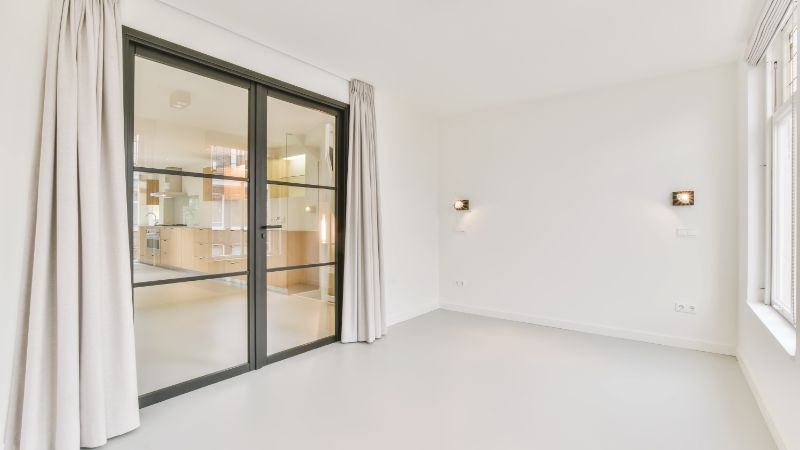
Material and Composition
The material of a sliding glass door significantly impacts its performance, durability, and aesthetic appeal. Each material option offers unique benefits and considerations for homeowners with different priorities and environments.
Aluminum Sliding Doors
Aluminum sliding doors provide exceptional strength and slim profiles, allowing for larger glass panels and better views. These doors resist warping, cracking, and rusting, making them highly durable even in harsh weather conditions.
Most aluminum doors feature thermal breaks that help reduce heat transfer, improving energy efficiency. This makes them suitable for various climates despite aluminum’s natural conductivity.
The sleek, modern appearance of aluminum frames complements contemporary architecture beautifully. They’re available in numerous finishes and colors through powder-coating processes.
Maintenance requirements are minimal—simply wipe with soapy water occasionally to keep them looking new. Their lightweight nature makes operation smooth and effortless compared to heavier materials.
Vinyl Sliding Doors
Vinyl sliding doors are among the most affordable options while offering excellent energy efficiency. The material naturally insulates well, helping to maintain comfortable indoor temperatures year-round.
These doors won’t rust, rot, or corrode, making them perfect for coastal areas or humid climates. Most vinyl doors contain hollow chambers that improve both insulation and structural strength.
Color options typically include white and beige, with some manufacturers offering woodgrain finishes to mimic natural materials. The color runs throughout the material, meaning scratches are less visible than on painted surfaces.
Vinyl requires almost no maintenance beyond occasional cleaning with mild soap and water. These doors never need painting or refinishing, saving homeowners time and money over their lifespan.
Wood Sliding Doors
Wood sliding doors add warmth and natural beauty that other materials simply can’t match. They can be crafted from various species including pine, oak, mahogany, and cherry, each offering unique grain patterns and colors.
These doors provide excellent natural insulation properties, helping to maintain energy efficiency. Many manufacturers use engineered wood components to improve stability and reduce warping issues.
Wood doors can be stained to highlight the natural grain or painted to match any color scheme. They’re incredibly versatile from a design perspective, complementing traditional, rustic, and even modern homes.
Regular maintenance is essential to preserve wood doors, including periodic resealing or repainting every 3-5 years. This upkeep helps protect against moisture damage, UV degradation, and insect infestation.
Fiberglass Sliding Doors
Fiberglass sliding doors deliver exceptional durability while requiring minimal maintenance. They withstand extreme temperatures, humidity, and salt air better than most other materials on the market.
These doors won’t warp, rot, rust, or corrode, making them ideal for challenging environments. Their excellent dimensional stability means they operate smoothly year after year without sticking or binding.
Many fiberglass doors feature realistic wood textures that convincingly mimic the appearance of natural wood. They can be stained or painted like wood but without the maintenance requirements.
Energy efficiency is another significant advantage, as fiberglass provides superior insulation. The material doesn’t conduct heat or cold readily, contributing to lower energy bills throughout the year.
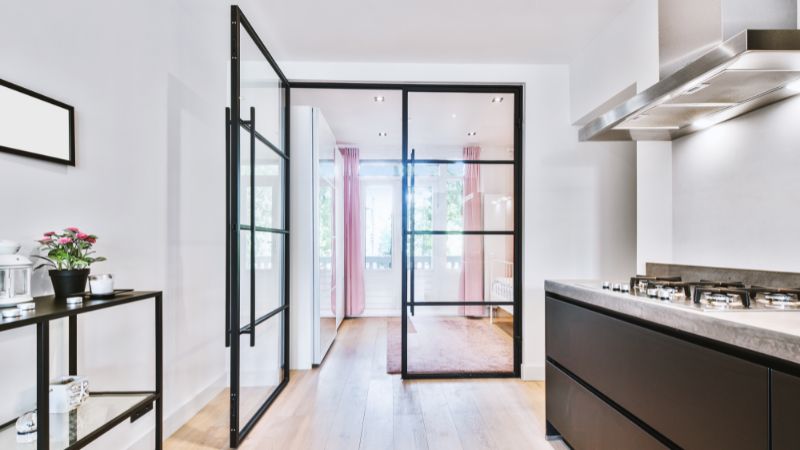
Composite Sliding Doors
Composite sliding doors combine multiple materials to maximize benefits while minimizing drawbacks. Common compositions include wood fibers mixed with polymers or recycled plastics reinforced with fiberglass.
These hybrid doors typically offer the aesthetic appeal of wood with significantly improved durability. They resist moisture, insects, and UV damage better than natural wood while maintaining a similar appearance.
Installation is straightforward as composite materials aren’t prone to expansion and contraction with temperature changes. This stability ensures smooth operation throughout different seasons.
Most composite doors require very little maintenance beyond basic cleaning. They never need painting or staining, though some higher-end options can be refinished if desired for aesthetic updates.
Environmental considerations make composites attractive to eco-conscious homeowners, as many contain recycled materials and have longer lifespans than traditional options.
Glass Options
The glass used in sliding doors significantly impacts energy efficiency, security, and aesthetics of your home. Different glass types offer distinct advantages depending on your specific needs and location.
Tempered Glass
Tempered glass is a safety glass that undergoes special heat treatment to increase its strength compared to standard glass. When broken, it shatters into small, relatively harmless pieces rather than sharp shards, reducing injury risk.
This type of glass is about four times stronger than regular glass, making it an excellent choice for homes with children or in areas prone to storms. Building codes often require tempered glass in doors and windows near floor level.
Despite its strength, tempered glass isn’t indestructible. It’s particularly vulnerable to impact at its edges. The heat-treating process also makes it impossible to cut or drill after manufacturing.
Most sliding glass door installations now include tempered glass as a standard feature for safety reasons.
Laminated Glass
Laminated glass consists of two or more glass panes bonded together with a layer of polyvinyl butyral (PVB) or ethylene-vinyl acetate (EVA) between them. This construction creates a highly durable and secure glass option.
If broken, the interlayer holds the glass pieces together, preventing shattering and maintaining the barrier. This feature makes laminated glass an excellent security option that deters break-ins.
Laminated glass also provides superior sound insulation, reducing outside noise by up to 50% compared to single-pane options. This makes it ideal for homes near busy streets or in urban settings.
Another benefit is UV protection—laminated glass can block up to 99% of harmful UV rays, protecting furniture and flooring from sun damage while still allowing natural light to enter your home.
Low-Emissivity (Low-E) Glass
Low-E glass features a microscopically thin, transparent coating that reflects heat while allowing light to pass through. This specialized glass helps maintain indoor temperatures by reflecting interior heat back inside during winter and keeping heat outside during summer.
The coating process doesn’t affect visibility but significantly improves energy efficiency. Homes with Low-E glass sliding doors can realize up to 30% savings on heating and cooling costs.
There are different types of Low-E coatings:
- Hard-coat (pyrolytic) Low-E is applied during manufacturing and is more durable
- Soft-coat (sputtered) Low-E offers better insulation but requires being sealed in an insulated glass unit
Low-E glass is particularly beneficial in extreme climates. In cold regions, it prevents heat loss, while in hot areas, it reduces cooling costs by blocking infrared heat.
Tinted Glass
Tinted glass contains special dyes or metals that color the glass and reduce light transmission. Colors typically include bronze, gray, blue, and green, each offering different aesthetics and functional properties.
Tinting provides several key benefits for sliding glass doors. It reduces glare from sunlight, making indoor spaces more comfortable and preventing fading of furniture and fabrics. The tint also offers some privacy while maintaining outward visibility.
Energy efficiency improves with tinted glass as it absorbs solar radiation. Bronze and gray tints typically absorb 45-50% of solar energy, reducing cooling costs during summer months.
The level of tinting can be customized to match your needs and local building codes. Darker tints provide more privacy and UV protection but reduce natural light, which may require additional indoor lighting during daytime.
Manufacturer Spotlight: Tengyu Glass Doors
For businesses seeking high-quality sliding glass door solutions, Tengyu stands out as a leading manufacturer since 2008. Our extensive product portfolio includes:
- Custom metal frame glass doors
- Frameless glass doors
- Sliding door systems with soft-close mechanisms
- Shower doors and partitions
- Premium door hardware solutions
Why Choose Tengyu:
- Quality Assurance: ISO9001 certified with comprehensive quality management systems
- R&D Capability: 33+ dedicated R&D engineers ensuring innovative solutions
- Manufacturing Excellence: 50,000 SQM state-of-the-art facility opened in 2021
- Export Expertise: 98% export-oriented business with global market experience
- Customization Options: Flexible design and sizing options to meet specific project requirements
Perfect for:
- Commercial developments
- Residential projects
- Hotel renovations
- Office partitioning
- Architectural glass solutions
For commercial enquiries and bulk orders, contact us today and sen an enquiry.
Experience the perfect blend of quality, innovation, and reliability with Tengyu’s comprehensive range of glass door solutions. Join the growing network of satisfied commercial clients worldwide.


